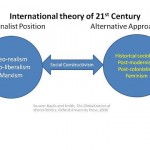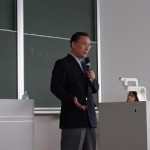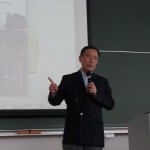2010年度法政大学法学部
Global Governance
■テーマ : Alternative Approaches to Tadational Theories of International Relations
■講 師 : 長谷川 祐弘 教授
■日 時 : 2010年5月19日(水) 13:30~15:00
■場 所 : 法政大学市ヶ谷キャンパス 外濠校舎 307教室
■作成者 : 亀山 未夢 法政大学法学部国際政治学科2年
***************************************
<Ⅰ.講義概要>
1.Traditional mainstream theories of international relations; Realism, Liberalism and Marxism
(1)Kenneth Waltz and other structural realists agree with Morgenthau and other classical realists that international politics is essentially a struggle for power, but they do not consider that this is a result of human nature. However, it is due to the lack of a supreme authority above stakes and the relative distribution of power in the international system. This is called Defensive Realism.
(2)John Mearsheimer said that the structure of the international system compels states to maximize their relative power position by strengthening military capabilities. This is called Relative gains.
2.Alternative approaches to international theories of “realism” and “liberalism”
(1)positivism
It consists of 4 points, 1.belief in the unity of science and non-science 2.distinction between facts and values 3.social science, like natural science, has regularities and can be discovered 4. Appeal to neutral facts. This is called empiricist epistemology
(2)What is meant by concept of security and difficulties
According to Barry Buzan, “People States and Fear (1983)”, Security in fact consist of not only political, economic, societal, environmental but as well as military. “In the case of security, the discussion is in the context of the international system, security is about the ability of states and societies to maintain their independent identity and their functional integrity.” He defined. Professor Hasegawa explained about national security, international security, community security, global security, human security and convergent theory.
(3)Epistemology
It is a study of how we can claim to know something. There are 2 groups of it. 1, Foundationalist insists that everything can be judged to be true or false. 2, Anti-foundationalist insists that it cannot be judged since there are no neutral grounds to judge.
(4)Social Constructivism
It is advocated by Alexander Wendt. Social Constructivists says that the social construction of reality is socially constructed nature of actors and their identity and interests. This is holism or structuralism. They said that the world is social and cannot be decomposed to the properties of already existing actors. Social theory of international relations by Alexander Wendt is that the social structure consisting of not only material resource, shared knowledge and values but also practices.
(5)Historical sociology
Social development in history and underlying structure that shapes the institutions and organizations, into which human society is arranged, includes violence, economy, and gender. Historical sociology focused their attention on the relationship between the domestic and the international society. This is the thought of constructivism as well.
(6)Post-modernism
They have distrust and deconstruct any claims to have direct references to the truth. They call for suspecting Marxism etc that claim that they have discovered fundamental truth about the world. Michel Foucault was interested in the relationship between knowledge and power. Addition to it, he is against the notion developed by rationalist and positivist that knowledge is immune from the function of power. All power requires knowledge and all knowledge relies on and reinforces existing power relationship.
(7)Changing character of war
Contemporary warfare is influenced by globalization, though nature of war remains constant. War is a brutal form of politics that involves the use of organized violence to get profit of certain group of people which includes terrorism, insurgency, ethnic cleansing, genocide, rape, and other criminal violence. War requires highly organized societies and groups.
(8)Rise of civilizational politics in the 21st century
Samuel Huntington, in his book “the clash of civilization” (1996), said that principal patterns of conflict and cooperation will be shaped by culture and ultimately by the civilization. There are 8 main civilizations that would determine the future of international politics; “Western, Confucian, Japanese, Islamic, Hindu, Slavic-Orthodox, Latin America, and possibly African”. According to Huntington, there are four long processes in the international system. 1st the relative decline of West, 2nd the rise of the Asian economy and its associated cultural affirmation with China poised for becoming the greatest power in human history, 3rd the population explosion in the Muslim world and the associated resurgence of Islam, 4th the impact of globalization including the extraordinary expansion of transnational flows of commerce, information and people.



